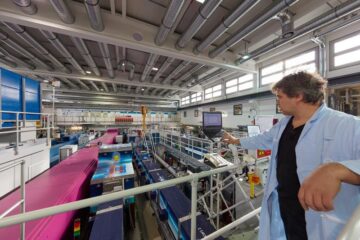Treating Alzheimer´s disease by targeting Amyloid ß-nitration – A novel therapeutic/diagnostic/ prophylactic approach

Part of the inflammatory response in Alzheimer´s disease (AD) is the upregulation of the inducible nitric oxide synthase NOS2 resulting in increased NO production. NO contributes to cell signaling by inducing posttranslational protein modifications. Under pathological conditions there is a shift to the formation of protein tyrosine nitration by secondary products like peroxynitrite and nitrogen dioxide.
The invention is based on the finding that amyloid ß (Aß) is nitrated at tyrosine 10 in AD-brains. Nitration accel-erates its aggregation and is present in Aß plaques. Injection of the nitrated protein into the brain of APP/PS1 transgenic mice leads to ß-amyloidosis. An antibody specific to the nitrated form of Aß has been developed. A therapeutic approach interfering with the nitrated Aß (rather than with the native Aß-peptide) may provide a very specific treatment with a reduced risk of side-effects. Commercial Opportunities: The invention offers a novel approach for an early diagnosis of AD. The invention also opens new avenues for developing either NCEs or biologicals interfering with the nitrated Aß. Antibody-based therapeutic approaches (e.g. passive/active vaccination) are currently been developed. Prophylactic approaches are also conceivable. On behalf of University of Bonn, PROvendis offers access to rights for commercial use as well as the opportunity for further co-development.
Weitere Informationen: PDF
PROvendis GmbH
Tel.: +49 (0)208/94105 10
Ansprechpartner
Dipl.-Ing. Alfred Schillert
Media Contact
Alle Nachrichten aus der Kategorie: Technologieangebote
Neueste Beiträge

Bakterien für klimaneutrale Chemikalien der Zukunft
Forschende an der ETH Zürich haben Bakterien im Labor so herangezüchtet, dass sie Methanol effizient verwerten können. Jetzt lässt sich der Stoffwechsel dieser Bakterien anzapfen, um wertvolle Produkte herzustellen, die…

Batterien: Heute die Materialien von morgen modellieren
Welche Faktoren bestimmen, wie schnell sich eine Batterie laden lässt? Dieser und weiteren Fragen gehen Forschende am Karlsruher Institut für Technologie (KIT) mit computergestützten Simulationen nach. Mikrostrukturmodelle tragen dazu bei,…

Porosität von Sedimentgestein mit Neutronen untersucht
Forschung am FRM II zu geologischen Lagerstätten. Dauerhafte unterirdische Lagerung von CO2 Poren so klein wie Bakterien Porenmessung mit Neutronen auf den Nanometer genau Ob Sedimentgesteine fossile Kohlenwasserstoffe speichern können…

















